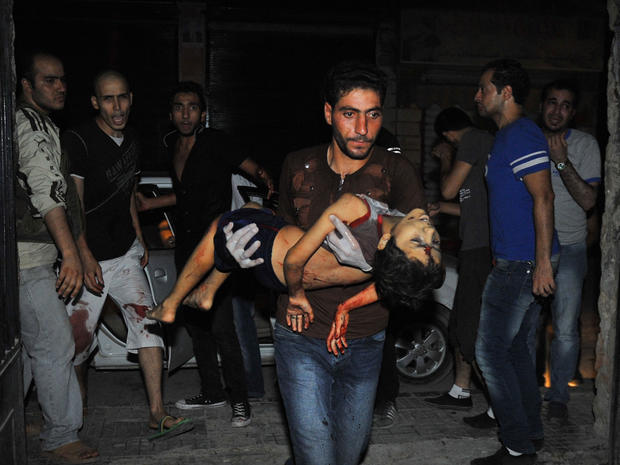Syria rebel leader says his men are ready to take on Assad's forces in fight for Aleppo
(CBS News) The State Department said Thursday the Syrian dictatorship is preparing a massacre in Syria's largest city, Aleppo.
Aleppo is a city of more than 3 million people, the size of Los Angeles. Refugees are pouring out of town. It was a year and a half ago that a popular uprising rebelled against the 42-year-old dictatorship of the Assad family. Rebels have taken some Aleppo's neighborhoods.
One recent photograph from the embattled city stands out: Five-year-old Mohammad Amumrej, wounded during Syrian army shelling of the town, is whisked away for medical treatment.
The rebels are also holding other pockets in Syria.
One village at a time, using light weapons and homemade bombs, fighters who call themselves the Sham Falcons have accomplished something very significant: They have pushed Syrian government forces back and carved out an area of rebel control in the hills of Jebel-a-Zawya, southwest of Aleppo.
Their leader, Abu Issa, is an Islamic scholar. For security reasons, he asked that we not show any part of his command center outside of one room.
"Thanks to god, we currently we have between six and seven thousand fighters," Issa said through a translator.
AP: U.S. weighs more direct involvement in Syria
Complete coverage: The Arab Spring
Syria opposition gathers; Aleppo in crosshairs
From their stronghold, they have spread out into towns and villages across the country. It has not been easy. The stark landscape is pockmarked with the scars of heavy fighting. But there are no Syrian army troops left in the area; to opposition members, it is known as "Free Syria".
Abu Issa and his men fought inch by inch to hold the territory, using rocket propelled grenades to stop the regime's heavily armored vehicles. But holding territory is no longer enough. Now they're taking the battle forward.
The commander told CBS News he has sent 1,500 fighters north to Aleppo - Syria's largest city and the engine of its economy - where a key battle is underway between rebel and government forces.
"The regime tried to send its army to Aleppo, but less than a third managed to reach it. Yesterday alone we destroyed more than 30 armored vehicles," Issa claimed.
Since the beginning of the uprising, the government has cast the rebels as religious extremists and terrorists, a charge that Abu Issa, a devout Muslim who studied in Saudi Arabia, denies.
On the question of whether he wants to see an Islamic state in Syria, Issa said: "Our only ambition is to create a state of justice and rights."
Issa denied charges that al Qaeda is fighting with the opposition.
"The revolution is for all the Syrian people. We don't allow anyone to undermine it, Islamists or not," Issa said.
Issa said the regime may have better weapons, but the rebels still have an advantage.
"We have faith and perseverance to rid ourselves from this slavery that has been imposed on us for over 40 years. That is enough," Issa said.
There are some major differences inside Syria from just a few months ago. Rebels now control large plots of territory in the north of the country. They also have control over many of the back roads. They're moving quite freely in certain areas.
But there are also some differences which favor the regime. The city of Idlib, where a CBS News crew spent time in February, is now completely inaccessible to rebels, and many of the main arteries - the main highways between major cities - are also totally inaccessible to rebels.
Another change is how few civilians you actually see. Many people are frightened to leave their homes. Stores are shuttered. The streets are empty. And in terms of the very real human cost of this uprising and the ensuing violence, one man told CBS News something that really stuck out: "It's terrible to say, but we've almost gone cold inside because all of us now have lost someone who we love."
